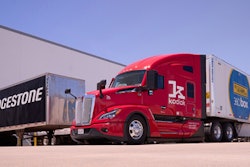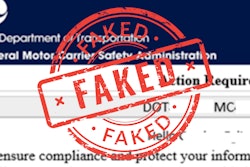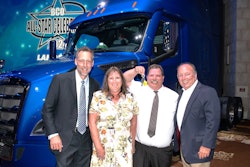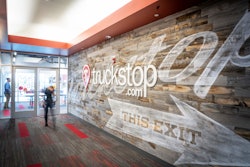When husband and wife owner-operator team Denise and Chris Jones of C.E. Jones Trucking completed a load for Vancouver, Washington-based broker Skyline Logistics, they were shocked to find the fine print on the rate confirmation said they had to sign up for something called "Verified Carrier."
Back at that time, last winter, Verified Carrier, a carrier vetting platform for brokers and carriers alike, cost $300 to start and then $49 a month thereafter. Denise and Chris were not happy.
"When I booked the load, I filled out a carrier packet," said Denise, detailing standard information about the business, and they were approved to haul what she calls a "good paying load" of forklifts within Tennessee.
Skyline, for its part, was thorough. "They asked us once we got there if we wouldn't mind sending a photo of the forklifts on the trailer," she said.
The Joneses got the load delivered without incident. That same day -- this all happened in mid-December 2023 -- they processed the paperwork and asked for quick pay. "Then they tell us, 'Oh no, you need to be a Verified Carrier first,'" before getting paid, she said. "They wouldn't pay us. On the rate con under the notes it said you must be a 'Verified Carrier' to get paid."

The Joneses have had their authority since 1991. To Denise, being a "verified carrier" just meant satisfying the paperwork requirements to book and haul the load. Having successfully hauled the load in a truck that had her correct MC, she couldn't imagine what's more verified than that. "A 'Verified Carrier' to us is one who has given their authority, insurance," and other information and who's then been "given the load," she said. "They cleared me to haul the freight," and if they wanted her to sign up for a service, like Macropoint or any other, "that's when you address that to somebody, up front."
Making an already tense payment situation worse, Verified Carrier asked for a pretty serious data commitment.
"They wanted your facial identity, bank information," she said, even for the Joneses to enter their bank password into a module in the onboarding process.
Denise wasn't having it.
"This is not happening," she said. Even when Skyline representatives said they'd waive the fee after she signed up, she held firm.
"No sir, I'm not giving you a penny," she said. "If you needed this information just to haul your freight, you should have had us" sign up beforehand. Eventually, the Joneses did get paid, and they never had to sign up for the service. But there was one last detail that took the load from a simple payment dispute to a full on conspiracy investigation in Denise's mind: The owner of Skyline Logistics, Alex Panfilov, also owned Verified Carrier.
"This is nothing but a scam," said Jones. "That's not the way to grow a business. Basically, they're tricking you. Anyone they’re having hauling freight -- now they can get a carrier base can sell their product to brokers."
Months passed. Even with the payment in hand, Jones kept at Panfilov, reaching out to his business partners and spreading the word about what she saw as underhanded tactics. Overdrive became aware of Verified Carrier and Skyline as Jones spread the word across the online world, but didn't connect the dots fully until Verified Carrier offered to give this author a demo of the service.
What emerged is the story told above, of a carrier outraged, yet also the tale of a broker caught up in this "fraud apocalypse," trying to combat it, and making some definite missteps along the way.
[Related: 'Fraud apocalypse': Brokers circling the wagons, shutting carriers out of freight]
Road to broker-carrier mutual trust?
Verified Carrier takes a very different approach to carrier compliance than outfits like Carrier Assure and others that use publicly available data to generate scores/grades/risk assessments for virtually any carrier under the sun. Instead, Verified Carrier only gives information about carriers that have onboarded onto the platform and provided eight key pieces of information to verify their identity -- including bank information.
Alex Panfilov served as CEO to both the Skyline brokerage and Verified Carrier at the time of the interaction with Jones, and gave his side of the story. First off, Panfilov said everyone got paid, nobody actually ended up having to pay $300 for Verified Carrier, and it only happened with 18 carriers, all of whom have their accounts now settled. Furthermore, Panfilov stepped away from Skyline and now focuses only on Verified Carrier. These days, everyone gets a free trial of the service. Only carriers that sign up for the ongoing monitoring service pay -- on a sliding scale depending on how many trucks they have, from as little as $10 a month to as much as $100 for big fleets said Panfilov.
[Related: Carriers cry foul over Carrier Assure's grading system]
"The carrier, when they booked a load, we did ask carriers to become verified at that time, but no carrier payments were held," he said. "We only did it for three or four weeks until we realized that's not the right approach. It was a mistake on our end, and we scratched it. C.E. Jones never got charged or onboarded."
Panfilov started out in trucking driving with his father-in-law and getting dispatched by his brother-in-law. He later moved on to heading up the brokerage side of Skyline in 2020. COVID-19 and the rise of industrial-scale freight fraud followed.
Double brokering hit Skyline hard. The brokerage found itself routinely tricked into paying both fraudster and the real carrier when scams unfolded. After significant loss, Panfilov emerged determined to never get fooled again. That's when he developed Verified Carrier.
"The only way we mark a carrier as failed is if they go willingly to us and give us fraudulent information," he said. This involves extensive manual labor and some innovative features, like using data from toll service transponders like Samsara and Bestpass to prove the carrier's trucks actually crossed/passed some scales.
[Related: The double-brokering slow burn: How it happens, and how to fight back]
But: Verified Carrier does have some pretty stringent info requirements of carriers to participate -- it's true you'll have to enter your bank password. "I would be hesitant myself to put in my bank information," acknowldeged Panfilov. "We changed our onboarding process, updating it and adding video explanations. We’re on the ninth revision process and our our success rate with the carriers" has improved dramatically.
Verified Carrier uses a service called Plaid, which requires you to log into your bank account. It's a well-known service. If you've ever had to link your Paypal account to your bank, for instance, you likely used Plaid to do it.
"We don’t store any information -- it’s only in Plaid," said Panfilov. "We have no connection to the bank account, the only thing we can see is the owner, the address, the real company name and phone number."
Double brokers constantly buy MC numbers, Panfilov said, and will even throw in a few extra thousand for an associated email and phone number. Brokers have become very picky about any lapse in authority, and often won't tender a load if there's something as simple as an insurance lapse. By linking the carrier to a bank account, now the sale of the MC number gets complicated. Would you sell a scammer bank account information that includes your social security number? Verified Carrier explained that the bank account step isn't foolproof, but combined with seven other verification steps, they hope to build trust that carriers onboarded in their system aren't reincarnated, aka "chameleon carriers."
[Related: FMCSA's confusing excuse for not enforcing its own rules]
By making it very complicated to sell an identity, "we hope [scammers will] just go back to stealing credit cards," a Verified Carrier representative explained during the demo.
Panfilov and Jones' incident underscores just how rare and how valuable trust is in today's trucking. Jones didn't trust Panfilov -- he appeared to be double dealing with a serious conflict of interest. (Panfilov now acknowledges that was the wrong tack.) And Panfilov didn't exactly trust Jones requesting a quick pay option from the broker, either. Skyline charged four or five percent, he said. Why not just go through a factoring company, and likely pay less? That set off a red flag for Panfilov, who then investigated the Joneses.
"With how much we were double paying these carriers, I was just trying to make sure I was paying the right carrier," he said of asking Jones to sign up for Verified Carrier. Often enough, double brokers in the "take the money and run" phase of their evolution, as detailed in this story, sometimes request a quick pay after whatever real carrier they've gotten to haul the load confirms delivery. The real carrier in such a scenario sometimes never sees a dime of that money.

How do owner-operators and small fleets survive and thrive in tough economic times? Find out in this webinar.
Join us for a live webinar Aug. 22 at 1 p.m. CT and hear from owner-operators and small fleets as we discuss how they prepared during the good times to weather the storms.
That wasn't the situation here. The Joneses note they only requested a quick pay after the hassle over the Verified Carrier sign-up language in the contract with Skyline.
"I would never factor" otherwise, said Jones. "It's a huge giveaway of money." Also, she adeed, Skyline's quick pay wasn't all that quick in the end, taking two weeks to land in her account.
Panfilov notes he felt the need to double-check, nonetheless, given past experiences and what's known about double brokers' methods in this day and age. He's spent time in the "seat of a truck, I still have a CDL," he said. "I drove, I dispatched, I know how it is. These last three years have been hard, a lot of carriers that were in the industry a long time took a loan for $200,000 to buy a truck and now they're bankrupt."
Plenty owners, too, though, he added, "are resilient. They know how to survive in these situations," yet he wants to draw a hard line against fraud. "When you don’t get paid for one or two or three loads," that can take even the most resilient among carriers down, he said.
About his past mistakes, he's remorseful but determined.
"There's nothing I can do about what happened to 18 carriers, but we caught it right away and shut it off," he said. "There's nothing else I can say. It was the wrong approach."










